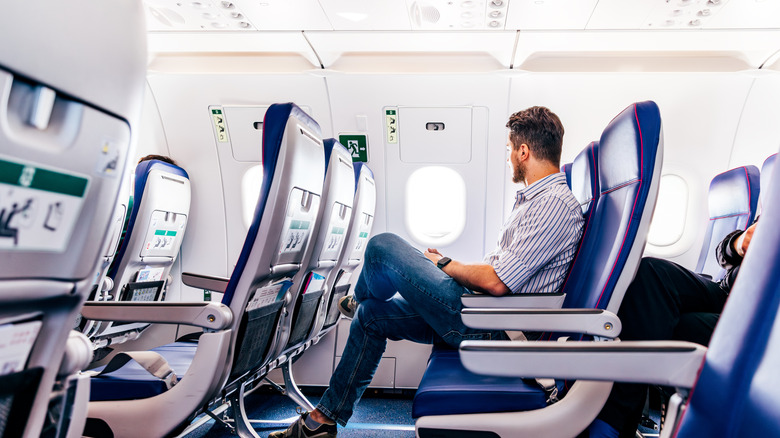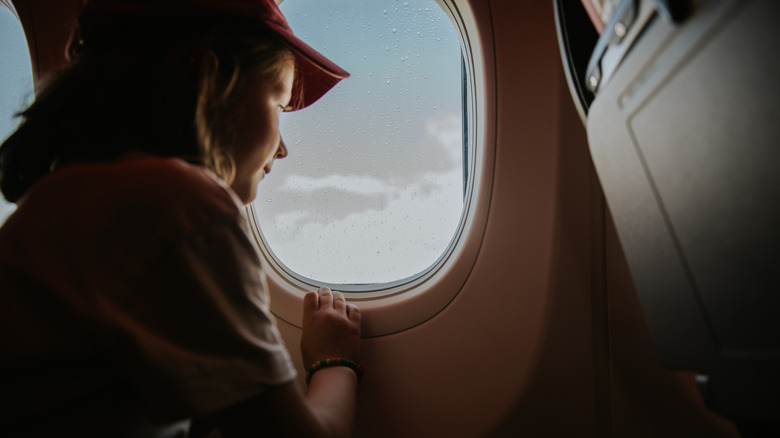What Travelers Need To Know About The New Crop Of Class Action Lawsuits Against Annoying Airline Practices
If you've ever paid to check a suitcase, squeezed into a seat seemingly designed for a contortionist, or missed a life event because of a flight delay — you're not alone. Air travel can be a hassle, and as flights keep getting more expensive, travelers are growing more sensitive to how airlines cut corners or tack on fees for the smallest conveniences. That's why travel hacks — like how to choose the best seat based on your preferences and tips to elevate your economy experience — often go viral. Now, it seems some passengers have had enough: Delta and United Airlines, two of the biggest commercial carriers in the U.S., are facing class-action lawsuits over misleading airplane seating configurations. Passengers on both airlines allege they paid extra for window seats, only to board and find themselves next to a blank wall.
Window seats are coveted by many travelers because they offer an outside view, a surface to lean on (perfect for in-flight naps), and control over the window shade. Airlines often up-charge for the ability to select these seats, but many travelers are willing to pay that premium to ensure they don't have to sit in the dreaded middle. When you cough up the extra cash, you expect to get what's promised.
A New York-based plaintiff named Nicholas Meyer is leading the suit against Delta. Meyer claims he booked a flight from LaGuardia Airport to Orange County, California, with a connection in Atlanta. Despite paying for a window seat, he spent almost 5 hours next to a bank wall. Similarly, passenger Aviva Copaken, part of the United suit, claims she paid for window seats on three consecutive flights. As someone who suffers from claustrophobia, the window was essential. But on all three flights, she says, there was no window.
The windowless window seat lawsuits against United and Delta
The separate lawsuits, both filed by Greenbaum Olbranz, seek refunds and potentially millions in damages for upwards of two million Delta and United passengers, as well as reform for airlines' disclosure practices. Fees to upgrade to seats on these airlines can vary from $50 to $100 per flight. While websites like SeatGuru help passengers determine seating layouts on different airplane models, plaintiffs maintain the airlines' responsibility for transparency. The lawsuit also notes airlines' claims that the lack of windows on particular aircraft, like the Boeing 737 and Boeing 757, is because of structural elements, for example, air conditioning ducts or electrical conduits. Some airlines do disclose windowless seats: According to the lawsuit, both American Airlines and Alaska Airlines also feature windowless "window" seats, but they disclose this information to passengers.
According to social media, airlines have long been aware of the windowless issue. "Your seat map should not consider this premium, nor should it call it a window seat," one Delta customer said in a Reddit post. "There is actually LESS leg room and no perks." Soon after the lawsuit went public, Reddit users noticed that United may have already made some changes to disclose which "window seat" selections in fact had "no window."
There have been many class-action lawsuits against major carriers recently. Delta faced legal action in May 2025 for failure to refund flight delays and cancellations following a computer outage in July 2024. Alaska Airlines also faced a class-action lawsuit after mechanical issues in 2024. If you have paid for a window seat on Delta or United and got a "fake window," review your receipts to determine whether you meet the lawsuit criteria. Keep an eye out for invitations to join the lawsuit, and consider consulting with legal experts specializing in class-action lawsuits to determine your eligibility.

